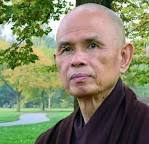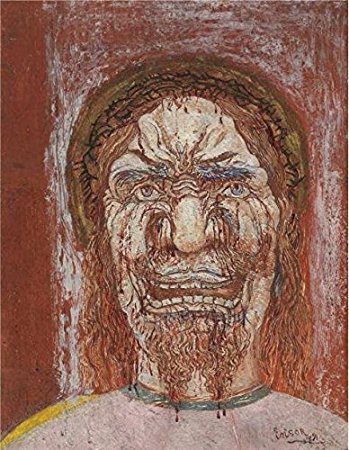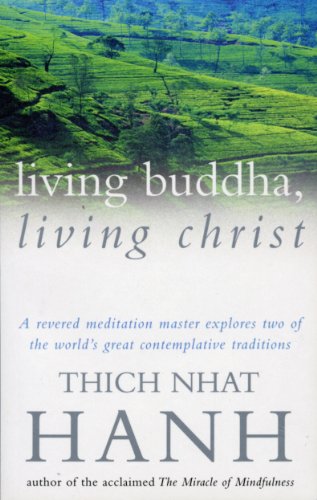I ‘ve been reading a book by Thich Nhat Hanh, the great Buddhist teacher of Plum Village in France, where he his presently recovering from a serious stroke. Like all great teachers in modern times, he has become an industry, because his books sell so well. Something of his love and peacefulness, as well as his wisdom is transmitted by his writings, although the books tend to include the same teachings in only slightly different contexts. Maybe this is no bad thing, as it allows the reader to grapple with his central concerns.
The volume I’m reading explores the notion of Jesus and Buddha as spiritual brothers, commending aspects of both faiths to Buddhists and Christians. As always when reading Thich Nhat Hanh I find myself gaining a great deal from his Buddhist insights, but not as much from his reflections on Jesus. Perhaps this is because I am unwilling to change my own image of Jesus. After all this book is happy enough to include the great Buddhist teaching, “If you meet the Buddha on the road, kill him!” a radical injunction which is meant to stop people getting stuck with their own image of the the great teacher. We are not to let the Buddha get in the way of ultimate truth. Can I apply that teaching to Jesus?
Perhaps not in quite the same way. The difference may be that Jesus allowed his earthly life to run out into failure, into a historical atrocity which he did little to prevent. He took the ordinary human risks of challenging the orthodoxies of his people, and they met him on the road and killed him. St. Paul interpreted his whole life as a process of self-emptying in order that God’s love for his creatures could become visible. The historical Buddha inasmuch as we can know him, also seems to have emptied himself, but the reality of his earthly life has been lost in the various philosophical myths of Buddhist tradition. Some would doubtless make the same criticism of the story of Jesus, but in fact Christian theology has explored that issue for 200 years now, and become good at separating what is historical from the faith of the church without rejecting either. Some of what Christians know about Jesus is blunt fact, which cannot be changed or circumvented.

Thich Nhat Hanh writes that he does not like the image of Jesus on the cross. I too have reservations about what I as a protestant Christian, identify as Roman Catholic piety, with its crucifixes and carrying of crosses. After all, we believe in Jesus’ resurrection. But given that his execution by the Roman punishment of crucifixion, as a failed Jewish messiah, is one of the best supported historical facts of the Christian tradition, I can’t imagine any genuine form of Christian faith that did not see it as fundamental.
Buddhism begins and ends with the issue of suffering as recognised by the Buddha as THE problem of being alive. His “noble path” is designed to lead its practitioners from suffering to liberation. All schools of Buddhism agree on this aim, although they disagree about the best methods of achieving it. So I can see that the image of Jesus on the cross may be offensive to a true Buddhist, if it encourages believers to get stuck just at the point from which they should be moving on. Now there is a Christian piety which describes Jesus desiring crucifixion as a sacrifice which would allow God’s wrath to be appeased and forgiveness offered to humanity. Indeed it’s easy to misread the Gospel of John is this way. A better line of interpretation is to see that the way of Jesus, his expression of God’s love in word and action, always puts its followers at risk, as it is unlikely to be popular anywhere. Jesus did not desire his torture and death but rather the open communication of God’s goodness; his execution is the cost of his uncompromising desire, not an end in iteself. Yes, his dying can be seen as sacrificial, but it is a pouring out of life for the sake of his mission, of which his resurrection is the sign of God’s approval.
For St Paul, self-emptying is an existential commitment to God’s goodness, not an intellectual practice as it has become in some forms of Buddhism. I do not think this is true of Thich Nhat Hanh, who has throughout his life poured out himself for the benefit of others, with great courage and compassion. But I think he resents the stubborn fact of Jesus’ suffering, which Christians will not leave behind: the risen body of Jesus still bears the wounds of his execution. They do not want to leave it behind because for them it signals God’s presence in the suffering of his creatures, not just as an act of sympathy but as a way by which they may share his eternal life. And yes, in heaven , the tears are all wiped away, but they are not dismissed as unreal.
 Buddhism is a profound revelation of wisdom, but it has become the ideal religion for busy capitalists, who benefit from its mindfulness training and meditation while neglecting its teachings on compassion. Its denial of a “real self” fits well with capitalism’s denial of meaningful life to both its devotees and its victims. Thich Nhat Hanh has throughout his pilgrimage shown his own commitment to the fruitful life of all creatures, including the victims of war and oppression. I think there is an issue to do with the intersection of fact and faith, history and mystery, which demands his further consideration.
Buddhism is a profound revelation of wisdom, but it has become the ideal religion for busy capitalists, who benefit from its mindfulness training and meditation while neglecting its teachings on compassion. Its denial of a “real self” fits well with capitalism’s denial of meaningful life to both its devotees and its victims. Thich Nhat Hanh has throughout his pilgrimage shown his own commitment to the fruitful life of all creatures, including the victims of war and oppression. I think there is an issue to do with the intersection of fact and faith, history and mystery, which demands his further consideration.
But this is an impertinent suggestion for me to make to one whose life is more Christlike than mine, and perhaps than his own comments about Christ.

You beautifully capture my own ambivalent feelings about this beautiful man and the tradition he represents. You very accurately and succinctly summarize what Buddhist mindfulness teaching has become for Western capitalists and spiritual dilettantes, but at the same time recognize the Christlikeness of Thich Nhat Hahn. Excellent insights as always.
LikeLiked by 1 person
I have been a Buddhist for 35 years. One thing I know for sure is that people often miss the profound teachings in what Thich Nhat Hahn expounds. The reason for this is the simplicity of how he teaches. It seems so simple as you are reading it that you mind does not recognize the importance of what he is saying. I guarantee that If you go back and read that book again you will see or understand something that you did not see the first time. If you go back and read it a year later it will happen again. That is the way of his teaching. I think that his objection to the image of the cross is based on his compassion. I some respects the crucifix is like an image of intense suffering frozen in time. I would seem to most Buddhist that focusing on the hope and joy of the resurrection would be more fruitful. More than being a amazing Buddhist teacher, Thich Nhat Hahn is an amazing human being. Good post.
LikeLiked by 1 person
Thanks Buddhistronin, dor your comment. i often do read him many times, as you suggest. I think we’re looking at a fundamental difference between Buddhism and Christianity in respect of suffering.
LikeLike
While vacationing in Hydra we met a lady who shared with us stories of her travels. She loves Thailand and Cambodia, but dislikes intensely Latin America. As our conversation continued, it turned out one of the factors that turned her against Latin America – besides the food – were the ever-present images of the crucified Christ. She could not stomach those bloody images and much preferred the images of Buddha that she encountered in Thailand and Cambodia. There is much to be said for her aversion to the Latin American iconography of the crucified Christ and the theology it evokes. Personally I have for many years wondered why Jesus Christ is never shown as smiling, like so many statues of Buddha show him smiling. Is it any wonder that medieval and even modern versions of Christianity are repugnant to many people?
LikeLiked by 1 person